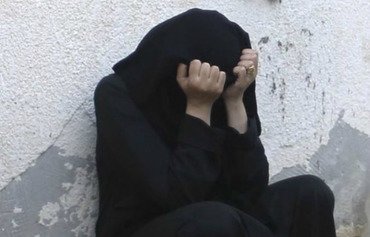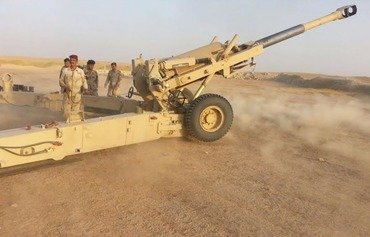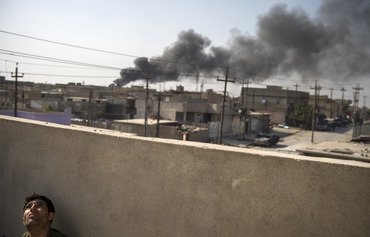As coalition airstrikes pound "Islamic State of Iraq and the Levant" (ISIL) revenue sources, the group has been resorting to desperate, and ultimately unsustainable, measures to remain viable, Iraqi officials tell Diyaruna.
These include selling the copper wire stripped from telecommunications infrastructure and extorting protection money from shopkeepers, they said.
Since December, coalition air raids have been targeting ISIL funding sources, which include oil fields in Iraq and Syria where it illegally extracts and sells oil and the smuggling networks through which it sells looted artefacts.
As its most lucrative money-making operations come under fire, ISIL has been forced to find other ways to fund its terror activity and pay its fighters' salaries.
Coalition strikes have played a central role in stopping more than 90% of ISIL's oil smuggling and sale to gangs on the borders, Iraqi Defence Ministry spokesman Brig. Gen. Yahya Rasul told Diyaruna.
ISIL used to extract and transport oil from al-Ward field in Syria and the Iraqi fields of al-Qayyara and al-Najma in Ninawa and Ajeel in Salaheddine to sell on the black market, he said, which brought in around $20 million a month.
Ajeel has been liberated from the group and the other oil fields are no longer of any use to it, he added, as coalition warplanes have been targeting tankers as they leave, forcing ISIL to cease all smuggling activity.
Oil theft and smuggling to networks collaborating with ISIL also has stopped in other fields in Iraq and Syria, Rasul said.
Around 500 oil tankers used by the group have been destroyed by international airstrikes, he said, and most of the roads it uses for transport have been blown up, rendering it incapable of profiting from oil.
Desperate search for money
With its central revenue streams in sharp decline, ISIL has been forced to find other ways to raise funds, Rasul said.
These include protection money extorted from farmers, small merchants and the owners of stores selling groceries and household items, and even street vendors, he said, as well as pharmacies, clinics and doctors.
The group forcibly collects zakat from the residents of areas under its control, he added, which it promises to distribute to the poor but never actually does.
It also confiscates and sells the property and homes of citizens it regards as "apostates", including members of the security forces, political parties and government agencies, as well as Christians, Yazidis and members of other sects.
The group also engages in "downright, open theft and negotiating ransom for releasing the people it kidnaps, usually a significant sum of $50,000 for every live victim and $1,000 for corpses handed to their families to be buried in a suitable manner rather than being thrown out on the street", Rasul said.
"ISIL's resort to these loathsome sources is further evidence of its deteriorated internal situation," he said, adding that the group is "acting like a bunch of bandits and exposing the falsity of its supposed 'caliphate'."
"The looting carried out by ISIL in several Iraqi areas has come to include stealing power equipment such as towers, poles and wires to extract copper and lead from them to sell, in an indication of the miserable state it has reached," Iraqi Minister of Electricity Qassim al-Fahdawi told Diyaruna.
ISIL finances in freefall
ISIL's financial situation has collapsed with unbelievable speed, Ninawa Operations Commander Maj. Gen. Najim al-Jabouri told Diyaruna.
Some of the group's elements are now receiving monthly salaries of less than $500, he said, while last year they were paid more than $1,500.
Workshops where the group manufactures explosives and car bombs have declined in number due to both coalition strikes and the group's inability to sustain them, al-Jabouri said.
Additionally, he said, the propaganda ISIL used to broadcast every other day about its distribution of food to the poor has faded since its fortunes have declined, even though this was an important part of its recruitment efforts.
ISIL's revenue streams are drying up, and in a few months Mosul and the remaining Iraqi towns under its control will be liberated, said security analyst Fouad Ali, an expert on extremist groups.
There will no longer be any protection payments or stealing of people's money, and other sources of funding also will stop being available, he told Diyaruna.
"They are trying to restore their force in any way possible, paying money and at the same time losing their infrastructure," he said, adding that the coalition efforts to stop the group are beginning to bear fruit.
Baghdad also must hold public awareness campaigns for the population in ISIL-held areas, he added, warning them against paying the group any money or buying anything from it, in addition to allocating reward money "for any resident who reports any information on their other, hidden funding sources".

![Iraqi police monitor the front line near the town of al-Fatha during a January operation to protect the nearby Ajeel and Allas oil fields. [Ahmad al-Rubaye/AFP]](/cnmi_di/images/2016/08/09/5998-Iraq-oil-fields-600_384.jpg)







Your article is correct; this is all true.
Reply1 Comment(s)